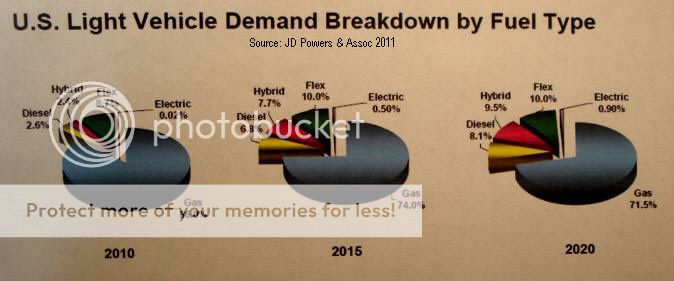1. "Electric cars are promoted as the chic harbinger of an environmentally benign future. Ads assure us of "zero emissions," and President Obama has promised a million on the road by 2015. With sales for 2012 coming in at about 50,000, that million-car figure is a pipe dream.... it's truly green, right? Not really.
2. For proponents ... the main argument is that their electric cars...don't contribute to global warming. And, sure, electric cars don't emit carbon-dioxide on the road. But the energy used for their manufacture and continual battery charges certainly doesfar more than most people realize.
3. A 2012 comprehensive life-cycle analysis in Journal of Industrial Ecology shows that almost half the lifetime carbon-dioxide emissions from an electric car come from the energy used to produce the car, especially the battery. The mining of lithium, for instance, is a less than green activity.
4. By contrast, the manufacture of a gas-powered car accounts for 17% of its lifetime carbon-dioxide emissions. When an electric car rolls off the production line, it has already been responsible for 30,000 pounds of carbon-dioxide emission. The amount for making a conventional car: 14,000 pounds
5. While electric-car owners may cruise around feeling virtuous, they still recharge using electricity overwhelmingly produced with fossil fuels. Thus, the life-cycle analysis shows that for every mile driven, the average electric car indirectly emits about six ounces of carbon-dioxide.
a. ...remember, the production of the electric car has already resulted in sizeable emissionsthe equivalent of 80,000 miles of travel in the vehicle.
6. So unless the electric car is driven a lot, it will never get ahead environmentally. And that turns out to be a challenge. Consider the Nissan Leaf. It has only a 73-mile range per charge. Drivers attempting long road trips, as in one BBC test drive, have reported that recharging takes so long that the average speed is close to six miles per houra bit faster than your average jogger.
7. ... the batteries in electric cars fade with time, just as they do in a cellphone. Nissan estimates that after five years, the less effective batteries in a typical Leaf bring the range down to 55 miles.
8. ...the huge initial emissions from its manufacture means the car will actually have put more carbon-dioxide in the atmosphere than a similar-size gasoline-powered car driven the same number of miles. Similarly, if the energy used to recharge the electric car comes mostly from coal-fired power plants, it will be responsible for the emission of almost 15 ounces of carbon-dioxide for every one of the 50,000 miles it is driventhree ounces more than a similar gas-powered car.
9. The current best estimate of the global warming damage of an extra ton of carbon-dioxide is about $5. This means an optimistic assessment of the avoided carbon-dioxide associated with an electric car will allow the owner to spare the world about $44 in climate damage. On the European emissions market, credit for 8.7 tons of carbon-dioxide costs $48.
a. ...U.S. federal government essentially subsidizes electric-car buyers with up to $7,500. In addition, more than $5.5 billion in federal grants and loans go directly to battery and electric-car manufacturers like California-based Fisker Automotive and Tesla Motors TSLA +1.90% . This is a very poor deal for taxpayers.
10. ....as a way to tackle global warming now it does virtually nothing."
Bjorn Lomborg: Green Cars Have a Dirty Little Secret - WSJ.com
"There's a sucker born every minute" is a phrase often credited to P. T. Barnum...
The only way for our on-site 'environmentalists' to read this article is with Percocet in a Pez dispenser.
2. For proponents ... the main argument is that their electric cars...don't contribute to global warming. And, sure, electric cars don't emit carbon-dioxide on the road. But the energy used for their manufacture and continual battery charges certainly doesfar more than most people realize.
3. A 2012 comprehensive life-cycle analysis in Journal of Industrial Ecology shows that almost half the lifetime carbon-dioxide emissions from an electric car come from the energy used to produce the car, especially the battery. The mining of lithium, for instance, is a less than green activity.
4. By contrast, the manufacture of a gas-powered car accounts for 17% of its lifetime carbon-dioxide emissions. When an electric car rolls off the production line, it has already been responsible for 30,000 pounds of carbon-dioxide emission. The amount for making a conventional car: 14,000 pounds
5. While electric-car owners may cruise around feeling virtuous, they still recharge using electricity overwhelmingly produced with fossil fuels. Thus, the life-cycle analysis shows that for every mile driven, the average electric car indirectly emits about six ounces of carbon-dioxide.
a. ...remember, the production of the electric car has already resulted in sizeable emissionsthe equivalent of 80,000 miles of travel in the vehicle.
6. So unless the electric car is driven a lot, it will never get ahead environmentally. And that turns out to be a challenge. Consider the Nissan Leaf. It has only a 73-mile range per charge. Drivers attempting long road trips, as in one BBC test drive, have reported that recharging takes so long that the average speed is close to six miles per houra bit faster than your average jogger.
7. ... the batteries in electric cars fade with time, just as they do in a cellphone. Nissan estimates that after five years, the less effective batteries in a typical Leaf bring the range down to 55 miles.
8. ...the huge initial emissions from its manufacture means the car will actually have put more carbon-dioxide in the atmosphere than a similar-size gasoline-powered car driven the same number of miles. Similarly, if the energy used to recharge the electric car comes mostly from coal-fired power plants, it will be responsible for the emission of almost 15 ounces of carbon-dioxide for every one of the 50,000 miles it is driventhree ounces more than a similar gas-powered car.
9. The current best estimate of the global warming damage of an extra ton of carbon-dioxide is about $5. This means an optimistic assessment of the avoided carbon-dioxide associated with an electric car will allow the owner to spare the world about $44 in climate damage. On the European emissions market, credit for 8.7 tons of carbon-dioxide costs $48.
a. ...U.S. federal government essentially subsidizes electric-car buyers with up to $7,500. In addition, more than $5.5 billion in federal grants and loans go directly to battery and electric-car manufacturers like California-based Fisker Automotive and Tesla Motors TSLA +1.90% . This is a very poor deal for taxpayers.
10. ....as a way to tackle global warming now it does virtually nothing."
Bjorn Lomborg: Green Cars Have a Dirty Little Secret - WSJ.com
"There's a sucker born every minute" is a phrase often credited to P. T. Barnum...
The only way for our on-site 'environmentalists' to read this article is with Percocet in a Pez dispenser.





